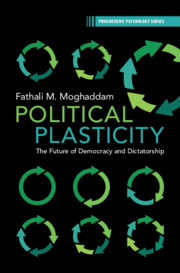Book contents
- Political Plasticity
- The Progressive Psychology Book Series
- Political Plasticity
- Copyright page
- Dedication
- Contents
- Figures
- Preface
- Acknowledgments
- Chapter 1 Political Plasticity, the Key to Understanding the Future of Democracy and Dictatorship
- Chapter 2 Hardwiring inside and outside People
- Part I Political Plasticity and Behavioral Continuity
- Chapter 3 Why Do Leaders Still Exist? Leadership and Followership
- Chapter 4 Rich and Poor – Still Just as Different
- Chapter 5 Ethnicity Is Forever
- Chapter 6 Religion, Eternally Present but with a Thousand Faces
- Chapter 7 The Built Environment and Behavioral Continuity
- Part II Change Agents, in Theory and Practice
- Part III Looking Ahead
- Notes
- References
- Index
Chapter 4 - Rich and Poor – Still Just as Different
from Part I - Political Plasticity and Behavioral Continuity
Published online by Cambridge University Press: 15 January 2023
- Political Plasticity
- The Progressive Psychology Book Series
- Political Plasticity
- Copyright page
- Dedication
- Contents
- Figures
- Preface
- Acknowledgments
- Chapter 1 Political Plasticity, the Key to Understanding the Future of Democracy and Dictatorship
- Chapter 2 Hardwiring inside and outside People
- Part I Political Plasticity and Behavioral Continuity
- Chapter 3 Why Do Leaders Still Exist? Leadership and Followership
- Chapter 4 Rich and Poor – Still Just as Different
- Chapter 5 Ethnicity Is Forever
- Chapter 6 Religion, Eternally Present but with a Thousand Faces
- Chapter 7 The Built Environment and Behavioral Continuity
- Part II Change Agents, in Theory and Practice
- Part III Looking Ahead
- Notes
- References
- Index
Summary
Despite the war on poverty declared in different ways by various politicians in different countries since World War II, the rich–poor divide continues as it has been more or less the same for the last ten thousand years or so. Also, the rich–poor divide continues across revolutions and across societies that describe themselves using different labels, such as communist, capitalist, socialist, liberal-democratic, and Islamic. For example, the number of billionaires in communist China rivals that in the capitalist United States, and the rich–poor divide in Islamic Iran is even great than in most European countries. Various legitimizing ideologies are used to justify the rich–poor divide, with the rich using their power and resources to shape education, the media, religious ideology, and the various other avenues for socialization and communication. The tendency for both the rich and the poor to believe in a just world and to blame the victim is discussed in this chapter, in relation to false consciousness and legitimizing ideologies, to explain the continuity of societies with enormous rich–poor divides.
Keywords
- Type
- Chapter
- Information
- Political PlasticityThe Future of Democracy and Dictatorship, pp. 37 - 47Publisher: Cambridge University PressPrint publication year: 2023



